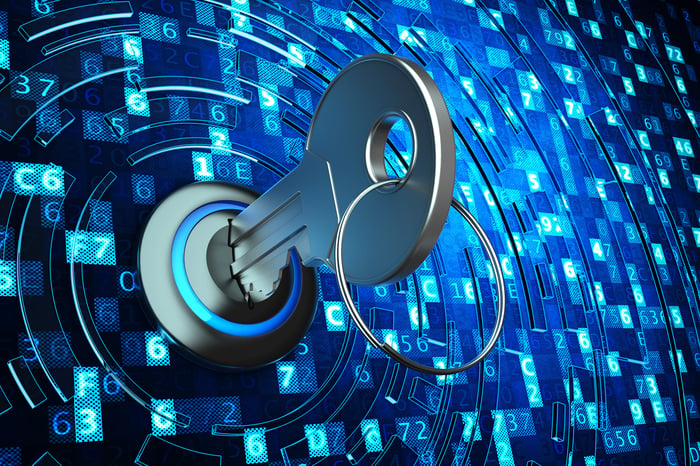Over the past year, there's only one word that's been buzzier among businesses and on Wall Street than "marijuana," and that would be "blockchain."
For those of you who aren't familiar with blockchain technology, or have heard about it but still don't completely understand it, let me offer a brief walk-through without all the technical jargon you're probably used to hearing.

Image source: Getty Images.
The buzz about blockchain, and its key advantages
Blockchain, in its simplest form, is a digital and decentralized ledger where transactions are recorded without the need for a financial third-party, which is often a bank. Decentralization is a fancy way of saying that this transaction data isn't stored in a central location, like a data center or huge server. Instead, this transaction data is stored on hard drives and servers all over the world. The reason it's done this way is as a security measure to ensure that no single entity, be it a law-abiding business or cybercriminal, can ever gain control of a network (and maybe its underlying cryptocurrency as well).
Blockchain itself is primarily geared at helping the financial services industry (i.e., banks) by offering two key advantages, other than decentralization. First, it eliminates banks from the equation. By breaking down a transaction to its bare-bones components -- a sender of funds and a receiver of funds -- blockchain may be able to reduce the amount of transaction fees consumers and/or businesses pay.
Second, and perhaps most important, blockchain offers the potential to significantly speed up the validation and settlement of remittances. Imagine you're sending money from your bank in the U.S. to a business in the United Kingdom. Using the current banking system, this payment could take up to five business days to be validated and settled. Comparably, if this transaction were processed over blockchain, it might be validated and settled virtually in real time or within a few seconds. That's how much of a game changer this technology could be.
It also has significant applications beyond the currency-only setting. Blockchain can be used for supply chain management purposes to locate items in real time, as well as instantly pinpoint supply chain inefficiencies. It can also help with logging medical records, regulating and monitoring Internet of Things networks, and in the creation of decentralized IDs, to name a few uses.

Image source: Getty Images.
According to a report published last year by Global Market Estimates, the blockchain technology market is expected to grow by an average -- yes, an average -- of 53% per year through 2025, hitting $12.5 billion. This icing on the cake demonstrates why blockchain is creating such a buzz on Wall Street and with retail investors.
What if blockchain isn't the answer?
But has anyone ever stopped to think about the other side of the coin? In essence, what if blockchain isn't the answer? I know, that sounds blasphemous given the advantages described above and the massive value creation we witnessed in 2017 in the cryptocurrency market. Still, blockchain falling flat on its face isn't entirely out of the question.
The biggest issue facing blockchain is a Catch-22. On one hand, blockchain has garnered plenty of interest from brand-name businesses, which have been testing it in various demos and small-scale projects. However, none of these brand-name companies has moved beyond proof-of-concept tests and into real-world scenarios on a large scale. Why, you ask? Blockchain, for all its advantages, is a nascent technology that hasn't proven its ability to be scaled in the real-world yet. No big businesses will make the shift away from their current software or remittance networks until this technology can prove its scalability. But the only way to prove this scalability is if some big businesses take a chance and implement it. It's a conundrum that's left blockchain technology in limbo.
But there are other concerns with blockchain technology. For example, networks that use cryptocurrency mining as a means of validating transactions can be extremely electricity intensive. Mining farms that are used to verify virtual currency transactions that use the "proof-of-work" model can cost a pretty penny in electricity expenses and weigh on local electrical grids.

Image source: Getty Images.
Blockchain, while safer in some sense than traditional remittance networks, isn't impervious to cybercriminals. A recent hack, where $534 million worth of NEM coins were stolen, as well as 850,000 bitcoin being taken in the 2014 Mt. Gox. hack, signal that there's work left to be done in shoring up blockchain security.
There are also serious integration concerns with blockchain technology. While it won't necessarily provide a benefit for every industry, some industries that would benefit would have to essentially scrap their existing infrastructure and rebuild entirely around blockchain. That's a very costly and time-consuming process.
And lastly, we can't overlook the uncertain regulatory status of cryptocurrencies throughout the world. While Japan has opened its arms to accepting bitcoin as currency, a half-dozen other nations have banned the world's most popular virtual token. A Swiss-cheese-like regulation could turn multinational businesses off from blockchain and any tethered virtual token.
In other words, blockchain may offer just as many disadvantages as advantages, despite the fact that these disadvantages have mostly been swept under the rug by investors.

Image source: Getty Images.
Even if blockchain is the answer, now is probably not the time
But let's say for a moment that blockchain is the answer and that it has the potential to revolutionize the financial services industry and other non-currency applications, such as supply chain management. Even if this is the case, the chances of blockchain being accepted with open arms by big businesses right now are slim to none. For years, we've watched as this technology has been tested in small-scale projects, and still no major company has stepped forward to fully implement blockchain as its primary ledger.
If we look back at a number of new, potentially game-changing technologies over the years, one thing becomes readily apparent: Wall Street and investors pretty much always (and I don't use this word lightly) overestimate how quickly it'll be adopted. From 3D-printers to decoding the human genome, these game-changing products and events prove to be near-term duds. New technologies require time to mature, develop, work out the kinks, and attract businesses. Yet, Wall Street and investors seem to forget this over and over again. Blockchain might just be the latest in a series of game-changing technologies that's been hyped by Wall Street and investors, but that'll require plenty of time to mature and work out the kinks.
In short, it's possible blockchain is the answer. It's also possible that it's not. But what I can say with a strong conviction is that either way, blockchain isn't the answer right now.




